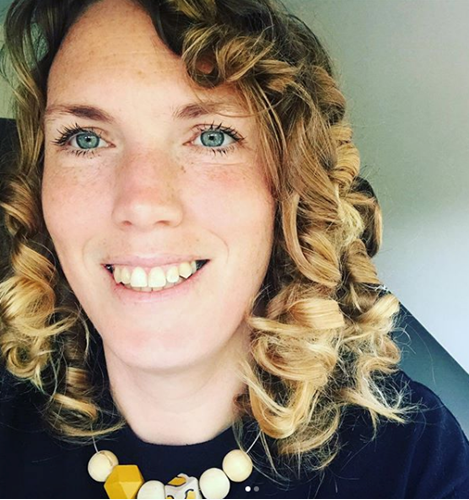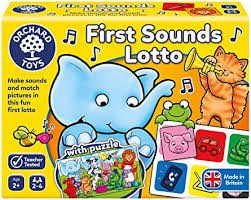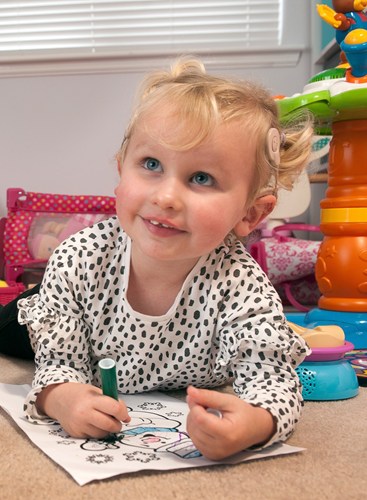Developing language skills with tech toys
By Kim Hagen (Technology Research Officer)
With such a wide range available, choosing toys for babies and toddlers can be a minefield. We explore how toys, games and apps can help your child develop early language skills.
Whether deaf children use sign language or spoken English, strong language and communication skills are important to their development. Your child needs language to be able to form their own thoughts, make themselves understood, understand you, and look after their emotional health and wellbeing.
If you’re raising your child orally, they’ll first need to develop their attention, listening, and social interaction skills. These have an important role in helping your child learn to take turns in conversations and to respond to what others say. Play is a great way to develop these skills, and there are various low-cost books, games and apps that can help.
Discovery 10-Button sound books
The Discovery 10-Button sound books (approximately £9.50 a book, available on Amazon) include interesting facts on different subjects, such as animals. They have 10 buttons which play different sounds that relate to what’s covered in the book. For example, Baby Farm Animals! has 10 sound buttons that play the sounds of the animals that feature in it. You can take turns pressing the buttons, listening to the sound and pointing to the object in the book that makes that sound. It encourages your child to focus on what you’re doing and to listen carefully to the sounds.

"The Honk on the Road! book is good for environmental awareness. If your child is learning oral English, transport sounds are an important step between babble sounds and attempting to imitate real words."
Pippa Smith, Speech and Language Therapist.
First Sounds Lotto game

First Sounds Lotto (approximately £8.50, available from Amazon) is a game that works with the free-of charge Orchard Toys app. The game includes playing boards and cards which you place in front of you and your child. Download and launch the app, select First Sounds Lotto, and press the picture in the app to play its sound. You can then ask your child what they think the sound was and encourage them to take the card that matches that sound, for their playing board.
Special Words app

Special Words (£19.99) is an app available on iOS and Android devices with six activity categories to help your child with their development in a range of ways. The Sound to Picture activity is especially helpful for developing listening skills. Tap the question mark to play a sound and get your child to match it to one of the four pictures on the screen.

"This app is great for helping our daughter learn and practise many different words and sounds, while still having fun matching the words to bright and colourful pictures."
Stuart, dad to Lois (4) who is profoundly deaf.
You can also get creative with toys you already have at home. You could try hiding a sound-making toy in the room for your child to find. They’ll have to really use their listening skills to locate it. You could also engage in a Ready, Steady, Go activity with a remote control car. Your child must wait for you to say ‘Ready, steady... go!’ before pressing the button which makes the car move. Every time you play, increase the waiting time between the words. This can help develop your child’s attention skills and ability to focus.

"Ever wondered why children use a new toy a few times but tend to quickly forget about it? This is because many toys, whether they are no-tech, low-tech or high-tech, provide a very finite end result e.g. if you push the ‘Go’ button on a remote control car, the outcome will always be the same. To extend your child’s attention and language, you need to introduce problems and processes. Try removing the batteries from some of the tech toys and then talk to your child about why the toy isn’t working. Support your child to use words or phrases to answer questions such as, ‘It’s broken,’ or ‘Fix it,’ and, ‘Open it.’"
Noel Kenely, Senior Auditory Verbal Therapist.
There are also many ways you can help your child develop these fundamental skills without using technology, such as:
- Listening walks: go for a walk in your local area and tell your child to listen out for sounds. Stop when you hear a sound and ask what the sound was.
- Instruments: matching drawings of musical instruments, such as a tambourine or xylophone, to the sound you make with those instruments. You could also make musical instruments, such as rice in a yoghurt pot.
- Copying rhythms: clap a rhythm and encourage your child to copy the same pattern.
Remember, you may have a toy library near you where you could borrow some of the toys mentioned in this article.
To find out more about technology that could help your child, visit the technology section of our website.
